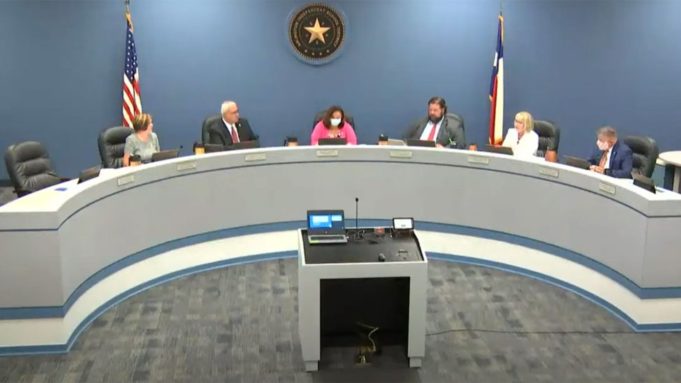As far as state laws are concerned, even glaringly conflicted campaign contributions are legal as long as officials follow Texas’ campaign disclosure laws. Tonight’s vote by the Arlington school board is a prime example of how campaign contributions from a donor can legally precede a vote that may financially benefit that same donor.
On the agenda at the 6:30 p.m. meeting at 1203 W. Pioneer Pkwy. is a motion for Arlington’s seven school board members to consider awarding a three-year contract for delinquent tax collection to Linebarger, Goggan, Blair, and Sampson, a prominent national firm that donates heavily to elected officials who are in positions to award lucrative contracts back to Linebarger.
If Arlington’s school board does bring on Linebarger, they will be hiring a law firm that, according to one former Fort Worth school board member, has no problem paving the way for more lucrative contracts in the future. In 2017, Ashley Paz alleged that Linebarger was behind the gutting of the Fort Worth school district’s ethics policy (“Ethics for Sale?” May 2018). Paz believes Linebarger’s lawyers weren’t happy with the school district’s restrictions on campaign contributions.
Linebarger’s lawyers, she said, “have a history of buying their multimillion-dollar contracts for a relatively small sum. Most other firms simply won’t go to these lengths. This type of transactional politics is dangerous, especially in urban districts like Arlington. The focus of their school board should be exclusively on student achievement. When the board begins to micromanage who gets what contract, kids aren’t a part of the equation. The CFO and their team should make a recommendation to the superintendent, and the superintendent should make that recommendation to the board. That is Governance 101.”
The Fort Worth school district, Tarrant County, and the City of Fort Worth are just a few of the local entities that have ongoing contracts with Linebarger. Search the campaign contributions of elected officials from those governmental groups and you will find regular contributions ranging from a few hundred dollars to several thousand. Common practice indicates that campaign contributions come with expectations of political favors, and Linebarger’s partners easily garner millions in annual fees from their North Texas contracts that are renewed often with minimal debate.
A recent review of campaign contributions to the Arlington school board revealed that Linebarger partners and one group that provides consulting services to the law firm contributed $15,625 to current school board members over the past few years, with many of those contributions beginning only a few months ago. The contributions can be tied to each of Arlington’s seven board members: Justin Chapa ($850), Melody Fowler ($2,750), Bowie Hogg ($3,000), Kecia Mays ($3,500), Sarah McMurrough ($1,550), Aaron Reich ($2,700), and David Wilbanks ($1,275).
None of this is illegal, but it does show how big business can influence local governance. Linebarger spent $4.5 million in national political contributions between 2000 and 2015, according to reporting by CNN that described Linebarger as the law firm that “runs Texas.” Those figures do not include city, county, and state contributions. A Linebarger spokesperson told CNN that the law firm spent $1 million in Texas in 2014 and 2015, which the reporters noted was considerably more than political contributions from much larger companies that also donate to Texas politicians.
For local school board members, a contribution of a few thousand dollars can be significant. Mays, for example, had around $6,000 on hand when Linebarger donated $2,500 to her campaign war chest in 2017. Fowler had $15,553 on hand when Linebarger contributed an additional $2,000.
Arlington school district’s media contact did not respond to my requests for comment, but one district staffer emailed me a document that describes the bidding process that led to Linebarger’s nomination for Thursday’s vote. The school district’s current contract for collecting delinquent property taxes expires at the end of the year.
A request for proposal (RFP) was issued to “solicit proposals from qualified law firms,” the document read. “The RFP was released on September 8, 2021. Two firms submitted proposals in response to the RFP. A committee comprised [sic] of [several staffers] evaluated the proposals, interviewed both proposers, and reviewed references. The administration recommends that the board award a three-year contract” to Linebarger.
A school district spokesperson said the current contracting law firm is Perdue, Brandon, Fielder, Collins, and Mott, whose contract expires on Dec. 31.
The document does not indicate the value of the contract. Fort Worth school district’s contract with Linebarger pays around $2 million in legal fees to the law firm every year, based on my past research. Arlington school district serves 60,000 students while Fort Worth’s public school system serves 76,000, meaning that the contracts are likely comparable monetarily.
Also on tonight’s agenda in Arlington is a vote to determine which five candidates sit on the five-member board of the Tarrant Appraisal District, the governmental group tasked with appraising properties and granting property tax exemptions. The connection between Linebarger and TAD is an apt one. Last December, Wendy Burgess, Tarrant County’s tax assessor-collector, pushed to award Linebarger a lucrative contract with the appraisal district even though Plano-based Tyler Technologies had bested Linebarger in TAD’s own evaluations (“Keeping Tabs on TAD,” Jan 6). Linebarger contributed sizable sums of money to Burgess before TAD’s vote to hire Linebarger over Tyler. The egregious influence of potentially dirty money led TAD’s board members to table the contract indefinitely. Burgess has not faced any discipline or much public backlash for her bald-faced end-around attempt.
School districts, cities, community colleges, and the county rely on property tax income, and state laws dictate that elected leaders from those groups vote for the board members of tax appraisal districts. TAD’s election cycle runs from November through December.
Like Linebarger, TAD has been a consistent topic of investigation by our news magazine.
I reached out to Linebarger’s media contact but did not hear back by press time. In past reporting, Linebarger spokespeople have told me that they make political contributions based on the merit of the candidate and irrespective of potential contract bids.













Thank you so much for writing these articles.
Dirty money = politics as usual = no accountability, results in no consequences so this “legal” bribery will continue unchecked.